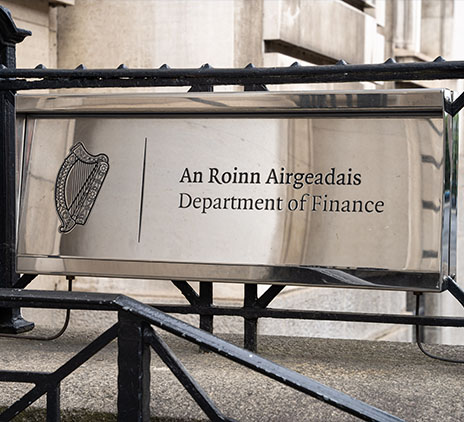-
Aviation Advisory
Our dedicated Aviation Advisory team bring best-in-class expertise across modelling, lease management, financial accounting and transaction execution as well as technical services completed by certified engineers.
-
Consulting
Our Consulting team guarantees quick turnarounds, lower partner-to-staff ratio than most and superior results delivered on a range of services.
-
Business Risk Services
Our Business Risk Services team deliver practical and pragmatic solutions that support clients in growing and protecting the inherent value of their businesses.
-
Deal Advisory
Our experienced Deal Advisory team has provided a range of transaction, valuation, deal advisory and restructuring services to clients for the past two decades.
-
Forensic Accounting
Our Forensic and Investigation Services team have targeted solutions to solve difficult challenges - making the difference between finding the truth or being left in the dark.
-
Financial Accounting and Advisory
Our FAAS team designs and implements creative solutions for organisations expanding into new markets or undertaking functional financial transformations.
-
Restructuring
Grant Thornton is Ireland’s leading provider of insolvency and corporate recovery solutions.
-
Risk Advisory
Our Risk Advisory team delivers innovative solutions and strategic insights for the Financial Services sector, addressing disruptive forces, regulatory changes, and emerging trends to enhance risk management and foster competitive advantage.
-
Sustainability Advisory
Our Sustainability Advisory team works with clients to accelerate their sustainability journey through innovative and pragmatic solutions.

-
 Asset management Asset management of the futureIn today’s global asset management landscape, there is an almost constant onslaught of change and complexity. To combat such complex change, asset managers need a consolidated approach. Read our publication and find out more about what you can achieve by choosing to work with us.
Asset management Asset management of the futureIn today’s global asset management landscape, there is an almost constant onslaught of change and complexity. To combat such complex change, asset managers need a consolidated approach. Read our publication and find out more about what you can achieve by choosing to work with us. -
 Internal Audit Maintaining Compliance with New EU Pension Directive IORP IIOn 28 April 2021, the Irish Government transposed IORP II (Institution for Occupational Retirement Provision), an EU directive on the activities and supervision of pension schemes, into law.
Internal Audit Maintaining Compliance with New EU Pension Directive IORP IIOn 28 April 2021, the Irish Government transposed IORP II (Institution for Occupational Retirement Provision), an EU directive on the activities and supervision of pension schemes, into law. -
 Risk, Compliance and Professional Standards FRED 82 – Periodic Updates to FRS 100 – 105The concept of a new suite of standards for the UK and Ireland, aligning with international financial reporting standards, was first conceived in 2002
Risk, Compliance and Professional Standards FRED 82 – Periodic Updates to FRS 100 – 105The concept of a new suite of standards for the UK and Ireland, aligning with international financial reporting standards, was first conceived in 2002 -
 Audit and Assurance Auditor transition: how to achieve a smooth changeoverAppointing new auditors may seem like a daunting task that will be disruptive to your business and a drain on the finance function. Nevertheless, there are a multitude of reasons to consider a change, including simply seeking a ‘fresh look’ at the business.
Audit and Assurance Auditor transition: how to achieve a smooth changeoverAppointing new auditors may seem like a daunting task that will be disruptive to your business and a drain on the finance function. Nevertheless, there are a multitude of reasons to consider a change, including simply seeking a ‘fresh look’ at the business.
-
Corporate Tax
Our Corporate Tax team is made up of more than 40 highly experienced senior partners and directors who work directly with a wide range of domestic and international clients; covering Corporation Tax, Company Secretarial, Employer Solutions, Global Mobility and Tax Incentives.
-
Financial Services Tax
The Grant Thornton team is made up of experts who are fully up to date in terms of changing and evolving tax legislation. This is combined with industry expertise and an in-depth knowledge of the evolving financial services regulatory landscape.
-
Indirect Tax Advisory & Compliance
Grant Thornton’s team of indirect tax specialists helps a range of clients across a variety of sectors including pharmaceuticals, financial services, construction and property and food to navigate these complexities.
-
International Tax
We develop close relationships with clients in order to gain a deep understanding of their businesses to ensure they make the right operational decisions. The wrong decision on how a company sells into a new market or establishes a new subsidiary can have major tax implications.
-
Private Client
Grant Thornton’s Private Client Services team can advise you on all areas of financial, pension, investment, succession and inheritance planning. We understand that each individual’s circumstances are different to the next and we tailor our services to suit your specific needs.


Receive the latest insights, news and more direct to your inbox.
The inherent ambiguity associated with crypto-assets has presented numerous regulatory and administrative challenges to governments, businesses and individuals across the globe. From the perspective of tax authorities, there is a deficit in terms of information available in respect of crypto-assets and this may be resulting in a loss of tax revenue.
In order to combat this potential loss, the European Union (EU) has introduced new rules to enhance tax compliance in the digital economy as well as updated parts of the Directive in Administrative Co-operation (DAC) in order to improve tax transparency amongst EU Member States.
DAC8 enters into force on 13 November 2023 and for the most part will come into effect for all EU Member States from 1 January 2026. Member States will have until 31 December 2025 to transpose DAC8 into national domestic law.
Key measures to enhance tax compliance and improve transparency
- The introduction of a common mandatory reporting regime for Crypto-Asset Service Providers and Crypto-Asset Operators.
- Amendments to the Common Reporting Standard (CRS) to bring e-money and central bank digital currency within scope.
- An amendment to the current exchange of information rules, specifically targeting advance cross border rulings for individuals.
- An amendment to the current rules under DAC1 to ensure that details of non-custodial dividend income (dividends that are neither paid nor cashed in a custodial account) are now exchanged between Member States.
- Increased sharing of Tax Identification Numbers (TINs) between Member States.
- The development of a central directory in which Member States can record information to satisfy automatic exchange of information obligations.
Key definitions
- Reporting Crypto-Asset Service Providers (RCASPs) are Crypto-Asset Service Providers and Crypto-Asset Operators who have “Reportable Users” within the EU. RCASPs will have reporting obligations under DAC8 irrespective of their size or tax residence status. RCASPs include both Crypto-Asset Service Providers and Crypto-Asset Operators. At a high level, the former is regulated under the MiCA (Markets in Crypto-Assets) regulation whereas the latter is not.
- Reportable Users - individuals or entities, who are resident in an EU Member State and who are customers of RCASPs.
- Reportable crypto-assets – effectively crypto-assets, which can be used as a form of payment or an investment. Assets categorised as reportable crypto-assets under DAC8 will include most crypto-currencies as well as certain non-fungible tokens (NFT’s).
- Reportable transactions – An RCASP will need to report the following transactions regardless of whether they are domestic or cross-border transactions:
- Exchange transactions between crypto-assets and fiat currencies;
- Exchange transactions between one or more forms of crypto-assets;
- Transfers of crypto-assets; and,
- Reportable Retail Payment Transactions, which refer to transfers of reportable crypto-assets as consideration for goods or services whose value exceeds US$50,000 (or equivalent currency).
Crypto-Asset Reporting Framework
The primary function of DAC8 is to introduce a common set of mandatory reporting obligations for reportable (crypto) transactions within the EU. Such reporting standards will closely mirror the Organisation for Economic Co-operation and Development’s (OECD’s) Crypto-Asset Reporting Framework. These reporting obligations are in conjunction with the MiCA regulation, which introduced a dedicated regulatory framework for crypto-asset service providers who provide services in the EU market.
It is important to note that while DAC8 introduces a new mandatory reporting regime, it does not impact how crypto-assets are taxed in EU Member States.
RCASPs will be required to fulfil the obligation of reporting certain information to the tax authorities in the Member State in which they are registered. RCASPs will effectively need to report details of all acquisitions and disposals of crypto-assets by persons resident in any EU Member State.
This will be an annual reporting requirement with the first report for the calendar year 2026 expected to be due within 9 months of the year-end (i.e. by 30 September 2027).
All such reports will need to be made under a fiat currency as there is no option for submitting reports under any crypto-currencies.
In addition to reporting obligations, RCASPs will also be obliged to apply certain due diligence procedures in respect of customers and retain certain information on file in respect of customers. Where a customer does not provide the requested information within 60 days after two reminders following the initial request, the RCASP will be obliged to cease transactions on the customer’s account.
Amendments to the CRS
Despite sharing certain similarities with crypto-products, e-money and central bank digital currencies will not be subject to the DAC8 reporting regime. Instead, they will be subject to the existing financial services reporting requirements under the CRS.
An RCASP that facilitates transactions in crypto-assets and e-money/ central bank digital currencies will therefore be subject to both DAC8 and DAC2 reporting obligations.
Minimum Penalty Requirements
It had been proposed to harmonise penalties for non-compliance with various DAC reporting obligations (DAC2, DAC4, DAC6, etc.) across the EU. Instead, DAC8 ultimately leaves the decision on penalties to the individual Member States, while stating that any penalties provided for should be “effective, proportionate and dissuasive.”
Exchange of information
The automatic exchange of advance cross-border rulings is extended to natural born persons in cases where:
- The value of the transaction or series of transactions of the advance cross-border ruling exceeds €1.5 million (or equivalent currency), if such amount is referred to in the ruling.
- The ruling relates to determining the tax residence of an individual in a Member State.
This provision is applicable to advance cross-border rulings that are issued, amended or renewed after 1 January 2026.
How can Grant Thornton help?
Grant Thornton can assist in implementing effective processes to ensure DAC8 risks are identified and managed accordingly as follows:
- Conduct an impact assessment
- Provide training and awareness
- Design and review governance and procedures
- Advise on ongoing compliance management and recommend software solutions
- Manage and assist with reporting and filing obligations










